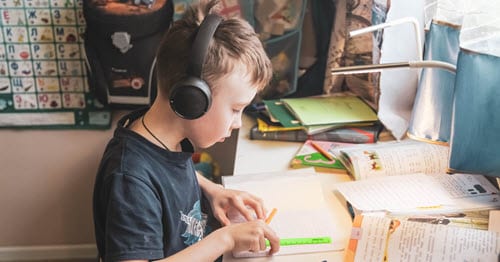Is Online School Right for Advanced Students or Students with Disabilities?
byConnections Academy
6 min to read
Whether your child flies through class material at a dizzying pace or struggles to connect with new concepts, school is likely to be a challenge for children who do not learn in the same way as the rest of their peers.
Teachers in bricks-and-mortar elementary schools try to offer differentiation to each student. Differentiation is an individualized approach to learning that lets teachers shape lessons around a child or small groups of students at similar levels. Some groups get more complex work, while other groups focus on strengthening skills. But this approach is not guaranteed or even always possible in a traditional classroom. Some students become bored while others fall behind.
Differentiation may be the deciding factor in your child’s education, which is why some think online schools are best for students with disabilities or advanced students.

Online School for Gifted and Advanced Learners
According to the Department of Education Office for Civil Rights, there are 3 million students in gifted and talented classes out of 50.7 million total students attending public schools. That’s only 6%.
The criteria for being admitted to gifted classes and the number of seats available varies by state and school system. The process is not transparent, leaving many families feeling confused and locked out of access to advanced learning. Studies also show that gifted programs often overlook minorities. It’s easy to believe that many children who would benefit from accelerated learning are going unserved.
Online school can provide advanced learners with additional opportunities for accelerated and individualized learning by offering:
- Personalized pacing. Since online school makes one-on-one learning possible with phone check-ins and chat sessions with a teacher, the student can vary the pacing of the classes in a way that is better suited to his or her needs. This means that your student can take longer on some material to learn even more or move faster through lessons.
- Deeper dives. The student can dive deeper with the teacher and material, learning more about certain topics of interest.
- Additional courses. If your advanced learner has mastered the basics and wants to branch out and add languages, arts, or computer programming, online school gives students this flexibility.
Many parents of gifted students consider homeschooling their children to make sure they are able to learn at their own pace and achieve all that they are capable of. But homeschooling is not the same as attending an online public school. There are several issues parents should consider as they choose between the two options.

Online School for Students with Learning Disabilities
According to the National Center for Education Statistics, 7.3 million students received special education services in the 2019–20 school year, or 14.5% of the total public school enrollment. These are students identified by teams of professionals as having a disability that adversely affects academic performance and as being in need of special education and related services.
Your child who requires a special education program can attend online public school and maintain his or her Individualized Education Plan (IEP) as a student with a disability. How would going to school online affect disabilities?
- Flexible pacing. Students who need to take more time on coursework are not moved along with a classroom full of other students. For a student with a specific learning disability like dyslexia, this means that he or she can work on building the foundations of reading, taking the time to learn decoding skills in a more confidence-building and nurturing home environment.
- Distraction-free setting. Students with ADHD, anxiety disorders, or sensory-integration issues often find school buildings and classrooms challenging. An online high school for ADHD students, or those with learning disabilities, doesn’t have fluorescent lights, cafeteria smells, chatty peers, classroom transitions, or intercom announcements, which all can be additional burdens and distractions for students with certain types of learning disabilities.
- Controlled peer interaction. Because this is online school with interaction mostly occurring on the computer, in-person get-togethers with peers can be planned, supervised, and contained to specific times. This is especially important for children who may need extra support because of social, emotional, or developmental issues.
Families whose children attend online school are able to leverage the flexible scheduling available in a virtual school environment to customize their students’ socialization so it aligns with their interests, values, and needs.
Lisa Blackstone, whose daughter has disabilities, spoke previously about how thankful she was for online education. “My daughter, Kristian, has autism spectrum disorder and ADHD,” Lisa said. “She has never liked school since K4, and she struggled with all aspects of her educational experience. The typical classroom was so overwhelming for her.
“I enrolled her in third grade in South Carolina Connections Academy with a lot of hesitancy. However, she is simply thriving. She loves her teachers and the LiveLesson® sessions, and really responds to how the lessons are presented. I’m simply amazed and excited for her. She is like a different person since starting, and she can now say that she does love school.

What is a twice-exceptional student?
A twice-exceptional student has a learning profile that combines elements of both giftedness and learning disability. Imagine a highly intelligent child on the autism spectrum, or a gifted math student who is also dyslexic.
The twice-exceptional student does not fit neatly into the gifted classroom or with special needs designations, and few schools can offer specialized instruction for them. But online school can be tailored to provide a unique mix of challenging academics and supportive teaching that can help these students thrive.
Sarah Pendland explained how the program at Iowa Connections Academy helped her child. “My son is a twice-exceptional student and couldn’t get into any gifted classes because of his organization issues,” she said. “[In his previous school], he was bored out of his mind and wasn’t being challenged. With Connections Academy, not only is he challenged, but he can also get into advanced classes and work at his own pace.”
Would Going to School Online Affect Your Child’s Disabilities?
So, is online high school for learning disabilities right for your child? Or is online school better for ADHD? The answer will depend on your child, your goals for your child, and what’s available from your local school district.
Your question may be “Are online schools more advanced than public schools?” Weighing online school vs. traditional school depends on what your expectations are for your child’s education, but you can visit the website for Connections Academy online public schools to learn how you could help shape your child’s education in an online school. You can also read about a diverse group of Connections Academy students who are meeting their needs studying online.



